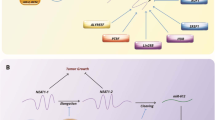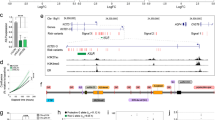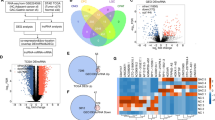Abstract
Colorectal cancer (CRC) is a common malignant cancer worldwide. Although the molecular mechanism of CRC carcinogenesis has been studied extensively, the details remain unclear. Small nucleolar RNAs (snoRNAs) have recently been reported to have essential functions in carcinogenesis, although their roles in CRC pathogenesis are largely unknown. In this study, we found that the H/ACA snoRNA SNORA24 was upregulated in various cancers, including CRC. SNORA24 expression was significantly associated with age and history of colon polyps in CRC patient cohorts, with high expression associated with a decreased 5-year overall survival. Our results indicated that the oncogenic function of SNORA24 is mediated by promoting G1/S phase transformation, cell proliferation, colony formation, and growth of xenograft tumors. Furthermore, SNORA24 knockdown induced massive apoptosis. RNA-sequencing and gene ontology (GO) enrichment analyses were performed to explore its downstream targets. Finally, we confirmed that SNORA24 regulates p53 protein stability in a proteasomal degradation pathway. Our study clarifies the oncogenic role of SNORA24 in CRC and advance the current model of the role of the p53 pathway in this process.
Graphical abstract







Similar content being viewed by others
Data availability
All data is available in the main text and supplementary materials. All models, nucleotide sequences, vectors, or plasmids used in the study are available from the corresponding author upon reasonable request.
Code availability
Not applicable.
References
Arvelo F, Sojo F, Cotte C. Biology of Colorectal Cancer. Ecancermedicalscience. 2015;9:520.
Asher G, Lotem J, Sachs L, Kahana C, Shaul Y. Mdm-2 and ubiquitin-independent p53 proteasomal degradation regulated by NQO1. Proc Natl Acad Sci USA. 2002;99(20):13125–30.
Asher G, Tsvetkov P, Kahana C, Shaul Y. A mechanism of ubiquitin-independent proteasomal degradation of the tumor suppressors p53 and p73. Genes Dev. 2005;19(3):316–21.
Bogaert J, Prenen H. Molecular genetics of colorectal cancer. Ann Gastroenterol. 2014;27(1):9–14.
Bortolin-Cavaillé ML, Cavaillé J. The SNORD115 (H/MBII-52) and SNORD116 (H/MBII-85) gene clusters at the imprinted Prader-Willi locus generate canonical box C/D snoRNAs. Nucleic Acids Res. 2012;40(14):6800–7.
Cao P, Yang A, Wang R, Xia X, Zhai Y, Li Y, et al. Germline duplication of SNORA18L5 increases risk for HBV-related hepatocellular carcinoma by altering localization of ribosomal proteins and decreasing levels of p53. Gastroenterology. 2018;155(2):542–56.
Cao W, Chen HD, Yu YW, Li N, Chen WQ. Changing profiles of cancer burden worldwide and in China: a secondary analysis of the global cancer statistics 2020. Chin Med J (Engl). 2021;134(7):783–91.
Chao CC. Mechanisms of p53 degradation. Clin Chim Acta. 2015;438:139–47.
Chu L, Su MY, Maggi LB Jr, Lu L, Mullins C, Crosby S, et al. Multiple myeloma-associated chromosomal translocation activates orphan snoRNA ACA11 to suppress oxidative stress. J Clin Invest. 2012;122(8):2793–806.
Ciombor KK, Wu C, Goldberg RM. Recent therapeutic advances in the treatment of colorectal cancer. Annu Rev Med. 2015;66:83–95.
Dong XY, Rodriguez C, Guo P, Sun X, Talbot JT, Zhou W, et al. SnoRNA U50 is a candidate tumor-suppressor gene at 6q14.3 with a mutation associated with clinically significant prostate cancer. Hum Mol Genet. 2008;17(7):1031–42.
Dong XY, Guo P, Boyd J, Sun X, Li Q, Zhou W, et al. Implication of snoRNA U50 in human breast cancer. J Genet Genomics. 2009;36(8):447–54.
Fang X, Yang D, Luo H, Wu S, Dong W, Xiao J, et al. SNORD126 promotes HCC and CRC cell growth by activating the PI3K-AKT pathway through FGFR2. J Mol Cell Biol. 2017;9(3):243–55.
Ferreira HJ, Heyn H, Moutinho C, Esteller M. CpG island hypermethylation-associated silencing of small nucleolar RNAs in human cancer. RNA Biol. 2012;9(6):881–90.
He JY, Liu X, Qi ZH, Wang Q, Lu WQ, Zhang QT, et al. Small nucleolar RNA, C/D box 16 (SNORD16) acts as a potential prognostic biomarker in colon cancer. Dose Response. 2020;18(2):1559325820917829.
Huang L, Liang XZ, Deng Y, Liang YB, Zhu X, Liang XY, et al. Prognostic value of small nucleolar RNAs (snoRNAs) for colon adenocarcinoma based on RNA sequencing data. Pathol Res Pract. 2020;216(6):152937.
Hume S, Dianov GL, Ramadan K. A unified model for the G1/S cell cycle transition. Nucleic Acids Res. 2020;48(22):12483–501.
Jeffrey SS. Cancer biomarker profiling with microRNAs. Nat Biotechnol. 2008;26(4):400–1.
Jiao Q, Ren Y, Ariston Gabrie AN, Wang Q, Wang Y, Du L, et al. Advances of immune checkpoints in colorectal cancer treatment. Biomed Pharmacother. 2020;123:109745.
Jinn S, Brandis KA, Ren A, Chacko A, Dudley-Rucker N, Gale SE, et al. snoRNA U17 regulates cellular cholesterol trafficking. Cell Metab. 2015;21(6):855–67.
Kawaji H, Nakamura M, Takahashi Y, Sandelin A, Katayama S, Fukuda S, et al. Hidden layers of human small RNAs. BMC Genomics. 2008;9:157.
Koduru SV, Tiwari AK, Hazard SW, Mahajan M, Ravnic DJ. Exploration of small RNA-seq data for small non-coding RNAs in Human Colorectal Cancer. J Genomics. 2017;5:16–31.
Kubbutat MH, Vousden KH. Keeping an old friend under control: regulation of p53 stability. Mol Med Today. 1998;4(6):250–6.
Lafaille FG, Harschnitz O, Lee YS, Zhang P, Hasek ML, Kerner G, et al. Human SNORA31 variations impair cortical neuron-intrinsic immunity to HSV-1 and underlie herpes simplex encephalitis. Nat Med. 2019;25(12):1873–84.
Liu R, Zhang Q, Shen L, Chen S, He J, Wang D, et al. Long noncoding RNA lnc-RI regulates DNA damage repair and radiation sensitivity of CRC cells through NHEJ pathway. Cell Biol Toxicol. 2020;36(5):493–507.
Mármol I, Sánchez-de-Diego C, Pradilla Dieste A, Cerrada E, Rodriguez Yoldi MJ. Colorectal carcinoma: a general overview and future perspectives in colorectal cancer. Int J Mol Sci. 2017;18(1):197.
McMahon M, Contreras A, Holm M, Uechi T, Forester CM, Pang X, et al. A single H/ACA small nucleolar RNA mediates tumor suppression downstream of oncogenic RAS. Elife. 2019;8:e48847.
Messersmith WA. NCCN guidelines updates: management of metastatic colorectal cancer. J Natl Compr Canc Netw. 2019;17(5.5):599–601.
Michel CI, Holley CL, Scruggs BS, Sidhu R, Brookheart RT, Listenberger LL, et al. Small nucleolar RNAs U32a, U33, and U35a are critical mediators of metabolic stress. Cell Metab. 2011;14(1):33–44.
Okugawa Y, Toiyama Y, Toden S, Mitoma H, Nagasaka T, Tanaka K, et al. Clinical significance of SNORA42 as an oncogene and a prognostic biomarker in colorectal cancer. Gut. 2017;66(1):107–17.
Scott MS, Avolio F, Ono M, Lamond AI, Barton GJ. Human miRNA precursors with box H/ACA snoRNA features. PLoS Comput Biol. 2009;5(9):e1000507.
Shen L, Wang Q, Liu R, Chen Z, Zhang X, Zhou P, et al. LncRNA lnc-RI regulates homologous recombination repair of DNA double-strand breaks by stabilizing RAD51 mRNA as a competitive endogenous RNA. Nucleic Acids Res. 2018;46(2):717–29.
Siprashvili Z, Webster DE, Johnston D, Shenoy RM, Ungewickell AJ, Bhaduri A, et al. The noncoding RNAs SNORD50A and SNORD50B bind K-Ras and are recurrently deleted in human cancer. Nat Genet. 2016;48(1):53–8.
Soulé S, Mellottée L, Arab A, Chen C, Martin JR. Jouvence a small nucleolar RNA required in the gut extends lifespan in Drosophila. Nat Commun. 2020;11(1):987.
Sun Y, Chen E, Li Y, Ye D, Cai Y, Wang Q, et al. H/ACA box small nucleolar RNA 7B acts as an oncogene and a potential prognostic biomarker in breast cancer. Cancer Cell Int. 2019;19:125.
Sung H, Ferlay J, Siegel RL, Laversanne M, Soerjomataram I, Jemal A, et al. Global cancer statistics 2020: GLOBOCAN estimates of incidence and mortality worldwide for 36 cancers in 185 countries. CA Cancer J Clin. 2021;71(3):209–49.
Williams GT, Farzaneh F. Are snoRNAs and snoRNA host genes new players in cancer? Nat Rev Cancer. 2012;12(2):84–8.
Wu L, Zheng J, Chen P, Liu Q, Yuan Y. Small nucleolar RNA ACA11 promotes proliferation, migration and invasion in hepatocellular carcinoma by targeting the PI3K/AKT signaling pathway. Biomed Pharmacother. 2017;90:705–12.
Wu L, Chang L, Wang H, Ma W, Peng Q, Yuan Y. Clinical significance of C/D box small nucleolar RNA U76 as an oncogene and a prognostic biomarker in hepatocellular carcinoma. Clin Res Hepatol Gastroenterol. 2018;42(1):82–91.
Xiao J, Lin H, Luo X, Luo X, Wang Z. miR-605 joins p53 network to form a p53:miR-605:Mdm2 positive feedback loop in response to stress. EMBO J. 2011;30(3):524–32.
Xie YH, Chen YX, Fang JY. Comprehensive review of targeted therapy for colorectal cancer. Signal Transduct Target Ther. 2020;5(1):22.
Xu Z, Wu W, Yan H, Hu Y, He Q, Luo P. Regulation of p53 stability as a therapeutic strategy for cancer. Biochem Pharmacol. 2021;185:114407.
Yang X, Li Y, Li L, Liu J, Wu M, Ye M. SnoRNAs are involved in the progression of ulcerative colitis and colorectal cancer. Dig Liver Dis. 2017;49(5):545–51.
Yoshida K, Toden S, Weng W, Shigeyasu K, Miyoshi J, Turner J, et al. SNORA21 - an oncogenic small nucleolar rna, with a prognostic biomarker potential in human colorectal cancer. EBioMedicine. 2017;22:68–77.
Yu F, Bracken CP, Pillman KA, Lawrence DM, Goodall GJ, Callen DF, et al. p53 represses the oncogenic Sno-MiR-28 derived from a SnoRNA. PLoS One. 2015;10(6):e0129190.
Zhang D, Zhou J, Gao J, Wu RY, Huang YL, Jin QW, et al. Targeting snoRNAs as an emerging method of therapeutic development for cancer. Am J Cancer Res. 2019;9(8):1504–16.
Zhang Z, Tao Y, Hua Q, Cai J, Ye X, Li H. SNORA71A Promotes colorectal cancer cell proliferation, migration, and invasion. Biomed Res Int. 2020;2020:8284576.
Zhen Y, Ye Y, Wang H, Xia Z, Wang B, Yi W, et al. Knockdown of SNHG8 repressed the growth, migration, and invasion of colorectal cancer cells by directly sponging with miR-663. Biomed Pharmacother. 2019;116:109000.
Acknowledgements
We thank Dr. QT Zhang (Liaoning Cancer Hospital) for kindly providing clinical samples.
Funding
This work was supported by grant from the National Natural Science Foundation of China [32071240 to Zhidong Wang] and China Postdoctoral Science Foundation (2020M673684 to Liping Shen).
Author information
Authors and Affiliations
Contributions
Study concept and design (Zhidong Wang, Xiaofei Zheng); experimental operation (Liping Shen, Chuxian Lin, Wenqing Lu, Yujv Huang); analysis of data (Liping Shen, Junyan He, Qi Wang); drafting of the manuscript (Liping Shen, Zhidong Wang).
Corresponding authors
Ethics declarations
Ethical approval and consent to participate
Written informed consent was obtained from participants. Clinical samples used in this study have been reviewed and approved by the Ethics Committee on Human Investigation of the Liaoning Cancer Hospital (20190970). Animal experiments were approved by the Ethics Committee of AMMS (IACUC-DWZX-2020–549, Beijing, China).
Consent for publication
All of the authors have written informed consent.
Competing interests
The authors declare no competing interests.
Additional information
Publisher's Note
Springer Nature remains neutral with regard to jurisdictional claims in published maps and institutional affiliations.
Supplementary Information
Below is the link to the electronic supplementary material.
Rights and permissions
Springer Nature or its licensor holds exclusive rights to this article under a publishing agreement with the author(s) or other rightsholder(s); author self-archiving of the accepted manuscript version of this article is solely governed by the terms of such publishing agreement and applicable law.
About this article
Cite this article
Shen, L., Lin, C., Lu, W. et al. Involvement of the oncogenic small nucleolar RNA SNORA24 in regulation of p53 stability in colorectal cancer. Cell Biol Toxicol 39, 1377–1394 (2023). https://doi.org/10.1007/s10565-022-09765-7
Received:
Accepted:
Published:
Issue Date:
DOI: https://doi.org/10.1007/s10565-022-09765-7




